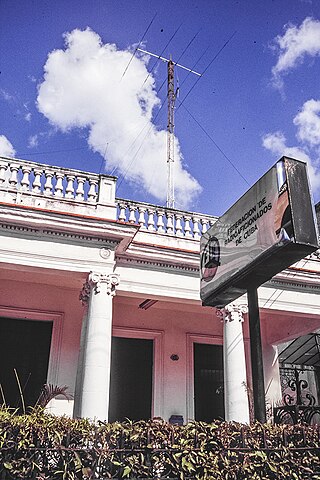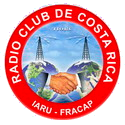
The International Amateur Radio Union (IARU) is an international confederation of national organisations that allows a forum for common matters of concern to amateur radio operators worldwide, and collectively represents matters to the International Telecommunication Union (ITU). The International Amateur Radio Union was founded in 1925 and, as of July 2021, it is composed of 172 national member societies.
The Federacion Mexicana de Radio Experimentadores, A.C. (FMRE) is a national non-profit organization for amateur radio enthusiasts in Mexico. Key membership benefits of the organization include QSL bureau services, the promotion and sponsorship of radio contests and operating awards, and an organization dedicated to emergency communications. FMRE promotes amateur radio by organizing classes and technical support to help enthusiasts earn their amateur radio license. Members receive a bimonthly magazine published by the organization, Onda corta. The FMRE also represents the interests of Mexican amateur radio operators before Mexican and international telecommunications regulatory authorities. FMRE is the national member society representing Mexico in the International Amateur Radio Union.
The Radio Amateur Society of Thailand under The Royal Patronage of His Majesty The King (RAST) is a national non-profit organization for amateur radio enthusiasts in Thailand. The organization is founded under the royal patronage of the King of Thailand, and qualifies as a charitable entity pursuant to a Thai Ministry of Finance declaration. The organization was founded on August 22, 1963 by a group of amateur radio operators who met at a restaurant in Bangkok. Among the first orders of business was to address official objections to the communications of radio amateurs in Thailand with amateur radio operators in other countries. The RAST represents the interests of Thai amateur radio operators and shortwave listeners before Thai and international telecommunications regulatory authorities. RAST is the national member society representing Thailand in the International Amateur Radio Union.
The Macau Amateur Radio Society is a non-profit organization for amateur radio enthusiasts in Macau, China. ARM was established during Portuguese Macau. The organization's primary mission is to popularize and promote amateur radio in Macau and to serve the community of the Special Administrative Region. One membership benefit of the organization is a QSL bureau for members who regularly make communications with amateur radio operators in other countries. ARM is the member society representing Macau in the International Amateur Radio Union.
The Unión de Radioaficionados Españoles (URE) is a national non-profit organization for amateur radio enthusiasts in Spain. The organization has approximately 8,000 members, predominantly amateur radio operators in Spain. URE promotes amateur radio by sponsoring amateur radio operating awards and radio contests. The URE also represents the interests of Spanish amateur radio operators and shortwave listeners before Spanish and international telecommunications regulatory authorities. URE is the national member society representing Spain in the International Amateur Radio Union.
The Associazione Radioamatori Italiani is a national non-profit organization for amateur radio enthusiasts in Italy.

The Radio Club Argentino (RCA) is a national non-profit organization for amateur radio enthusiasts in Argentina. RCA was founded in Buenos Aires on October 21, 1921. Key membership benefits in the organization include the use of a QSL bureau for those amateur radio operators in regular contact with amateur radio operators in other countries, a group insurance policy, and a quarterly membership journal called Revista del Radio Club Argentino. The Radio Club Argentino represents the interests of Argentine amateur radio operators before Argentine and international regulatory authorities. It is also the national member society representing Argentina in the International Amateur Radio Union.
The Rede dos Emissores Portugueses (REP) is a national non-profit organization for amateur radio enthusiasts in Portugal. REP was founded in 1926 by Eugenio de Avillez P1AE, an early Portuguese radio experimenter. Key membership benefits of the REP include a QSL bureau for those amateur radio operators in regular communications with other amateur radio operators in foreign countries, and the sponsorship of amateur radio operating awards and radio contests. The REP represents the interests of Portuguese amateur radio operators before Portuguese and international regulatory authorities. REP is the national member society representing Portugal in the International Amateur Radio Union, which it joined in 1931.

The Radio Club de Chile (RCCH) is a national non-profit organization for amateur radio enthusiasts in Chile. Key membership benefits of RCCH include the sponsorship of amateur radio operating awards and radio contests, and a QSL bureau for those members who regularly communicate with amateur radio operators in other countries. RCCH represents the interests of Chilean amateur radio operators before Chilean and international telecommunications regulatory authorities. RCCH is the national member society representing Chile in the International Amateur Radio Union.
The Radio Club Venezolano (RCV) is a national non-profit organization for amateur radio enthusiasts in Venezuela. Key membership benefits of RCV include the sponsorship of amateur radio operating awards and radio contests, and a QSL bureau for those members who regularly communicate with amateur radio operators in other countries. RCV represents the interests of Venezuelan amateur radio operators before Venezuelan and international telecommunications regulatory authorities. RCV is the national member society representing Venezuela in the International Amateur Radio Union.
The Radio Club Peruano (RCP) is a national non-profit organization for amateur radio enthusiasts in Peru. RCP was founded on December 6, 1930, and the first General Meeting of the organization was held in the halls of the Library of the Geographical Society in Lima, Peru in January, 1931. The RCP operates a QSL bureau for those amateur radio operators in regular contact with amateur radio operators in other countries, and supports amateur radio operating awards and radio contests. Radio Club Peruano represents the interests of Peruvian amateur radio operators before national and international regulatory authorities. RCP is the national member society representing Peru in the International Amateur Radio Union.
The Club de Radioaficionados de Guatemala (CRAG) is a national non-profit organization for amateur radio enthusiasts in Guatemala. Key membership benefits of the CRAG include a QSL bureau for those amateur radio operators in regular communications with other amateur radio operators in foreign countries, and a network to support amateur radio emergency communications. CRAG represents the interests of Guatemalan amateur radio operators before Guatemalan and international regulatory authorities. CRAG is the national member society representing Guatemala in the International Amateur Radio Union.
The Radio Club de Honduras (RCH) is a national non-profit organization for amateur radio enthusiasts in Honduras. RCH was founded on July 26, 1958, to support the scientific and technical interests of those in Honduras with an interest in radio. Key membership benefits of RCH include a QSL bureau for those amateur radio operators in regular communications with other amateur radio operators in foreign countries and sponsorship of amateur radio operating awards and radio contests. RCH represents the interests of Honduran amateur radio operators before Honduran and international regulatory authorities. RCH is the national member society representing Honduras in the International Amateur Radio Union.

The Federacion de Radioaficionados de Cuba (FRC) is a national non-profit organization for amateur radio enthusiasts in Cuba. The FRC claims that 98% of all Cuban amateur radio operators belong to the organization. These members are organized in 180 local amateur radio clubs that are affiliated with the Federacion de Radioaficionados de Cuba. Key membership benefits of FRC include a QSL bureau for those amateur radio operators in regular communications with other amateur radio operators in foreign countries and sponsorship of amateur radio operating awards and radio contests. FRC acts as a liaison between Cuban amateur radio operators and Cuban regulatory authorities. FRC is the national member society representing Cuba in the International Amateur Radio Union.

The Club de Radioexperimentadores de Nicaragua (CREN) is a national non-profit organization for amateur radio enthusiasts in Nicaragua. Key membership benefits of the CREN include a QSL bureau for those amateur radio operators in regular communications with other amateur radio operators in foreign countries, and a network to support amateur radio emergency communications. CREN represents the interests of Nicaraguan amateur radio operators before Nicaraguan and international regulatory authorities. CREN is the national member society representing Nicaragua in the International Amateur Radio Union.

The Radio Club de Costa Rica (RCCR) is a national non-profit organization for amateur radio enthusiasts in Costa Rica. Key membership benefits of the RCCR include a QSL bureau for those amateur radio operators in regular communications with other amateur radio operators in foreign countries, and a network to support amateur radio emergency communications. RCCR represents the interests of Costa Rican amateur radio operators before Costa Rican and international regulatory authorities. RCCR is the national member society representing Costa Rica in the International Amateur Radio Union.

The Liga Panameña de Radioaficionados (LPRA) is a national non-profit organization for amateur radio enthusiasts in Panama. Key membership benefits of the LPRA include a QSL bureau for those amateur radio operators in regular communications with other amateur radio operators in foreign countries, and a network to support amateur radio emergency communications. LPRA represents the interests of Panamanian amateur radio operators before Panamanian and international regulatory authorities. LPRA is the national member society representing Panama in the International Amateur Radio Union.
The Syrian Scientific Technical Amateur Radio Society (SSTARS) is a national non-profit organization for amateur radio enthusiasts in Syria. The organization was founded in 1947 as the Technical Institute of Radio by a group of amateur radio enthusiasts in Damascus. Rashid Jalal YK1AA served as the organization president from 1947 until 1983. The organization formally incorporated under its new name in 2005.
The Association Royale des Radio Amateurs du Maroc (ARRAM) is a national non-profit organization for amateur radio enthusiasts in Morocco. Key membership benefits of the ARRAM include a QSL bureau for those amateur radio operators in regular communications with other amateur radio operators in foreign countries, and a network to support amateur radio emergency communications. The ARRAM operates a club station with the call sign CN8MC. The ARRAM represents the interests of Moroccan amateur radio operators before Moroccan and international regulatory authorities. The ARRAM is the national member society representing Morocco in the International Amateur Radio Union.

The El Salvador national rugby union team, nicknamed Los Torogoces, represents El Salvador in rugby union. They had their first international tournament in 2011 in Costa Rica along the other teams from Central America, winning the Silver Cup.








